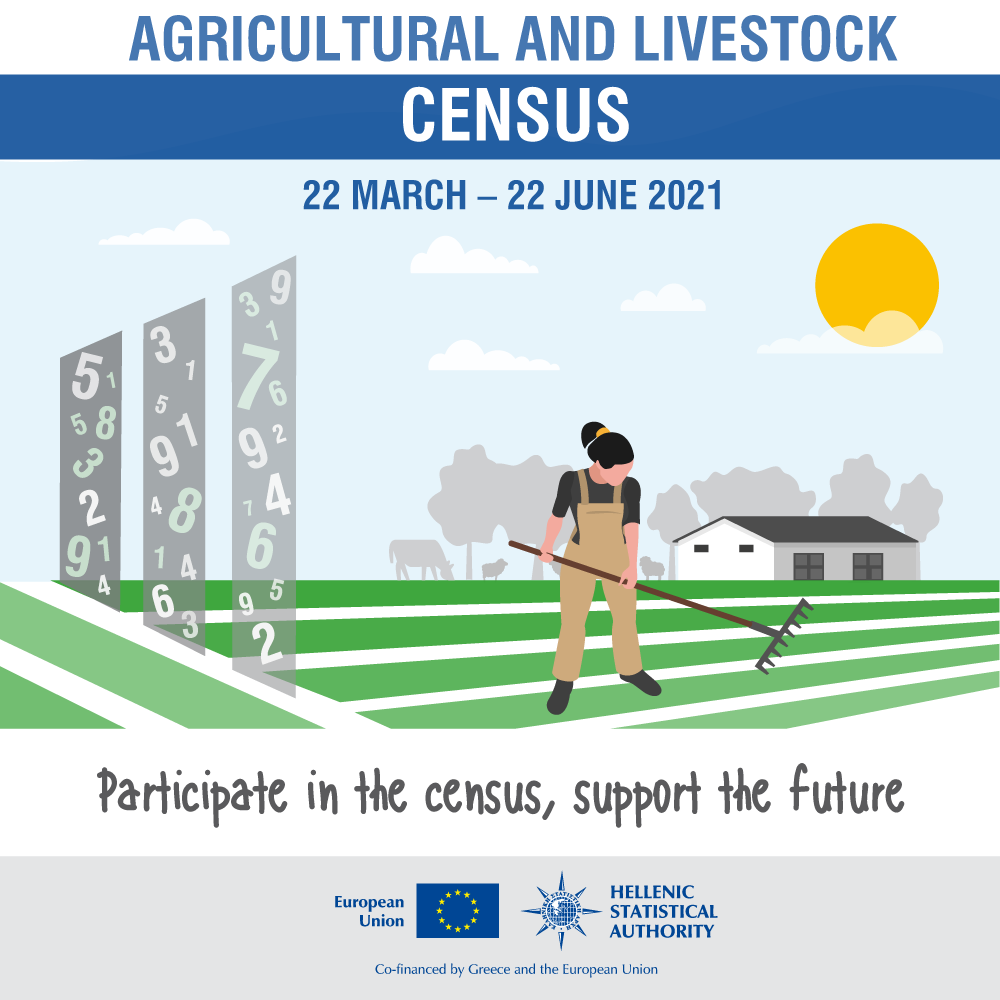2021 Agricultural – Livestock Census
The Agricultural – Livestock Census is conducted in all Member States of the European Union, pursuant to Regulation (EU) 2018/1091 on Integrated Farm Statistics (IFS) and in accordance with the recommendations of the World Food and Agriculture Organisation of the United Nations (FAO), as set out in the detailed manual “WCA – Word Programme for the Census of Agriculture 2020”.

The purpose of the Agricultural – Livestock Census is to collect objective and quantitative information on the structure of the agricultural and livestock sector, with the aim of identifying the basic characteristics of the structure of all agricultural and livestock holdings, depicting the Greek agriculture- livestock. In particular, the census aims to collect data on:
a) the number of agricultural and livestock holdings at national, regional and local level,
b) the characteristics of the agricultural and livestock holdings as regards their legal form, occupation status of the agricultural land and their structure (type of crops, species of farmed animals and birds, cultivation techniques and animal housing practices), as well as other environmental aspects (e.g. use of fertilisers, manure management, etc.),
c) other activities of the holdings, such as other gainful activities of the agricultural or livestock holdings, their participation in rural development support measures, etc.,
d) the population employed in the holdings,
e) geolocation of the holding.
The results of the Agricultural-Livestock Census meet national and Union needs and other obligations of the Country to international organisations (i.e., the United Nations, OECD, FAO).
More specifically, the Census:
a) collects data which are necessary for drawing agricultural, economic, social and environmental policies at national, regional and local level, while at the same time they are necessary for defining the EU Common Agricultural Policy and monitoring the implementation of the new rural development measures,
b) contributes significantly to informed decision-making in the public and private sectors of the economy,
c) is a key instrument for the implementation of state programmes of economic and social development and regional planning, as well as academic and other research programmes, both in the agricultural sector and in all sectors directly related to it,
d) contributes to the dissemination of statistical information to the wider community, since the statistical data deriving from the Census are of direct or indirect interest to each citizen,
e) contributes to the development of agrotourism,
f) it is the main source of information for compiling and updating the Statistical Agricultural Register, which is the main framework for carrying out many statistical surveys in the field of agriculture-livestock, and
g) it forms the basis for compiling environmental and regional indicators for the development of the agri-environmental policy.
Agricultural - Livestock Census is co- financed by Greece and the European Union.
Methodology of the Census
The circumstances arising from the Covid-19 pandemic made it necessary to elaborate a special planning of the Census process, aiming at protecting public health. In this context, the new approach is based on the electronic self-enumeration, through a specially designed web application. Where this is not possible, the questionnaires will be completed through interviews after having arranged an appointment in municipal/communal offices or by telephone and, in exceptional cases, through an interview with physical presence in the holding, always in compliance with the public health protection measures. In all cases, data will be collected using an electronic questionnaire via a web application developed by ELSTAT.
Data security
The data of the Agricultural-Livestock Census will be stored in a dedicated secure database, which will include all the collected variables. Access to the information contained in the database will be subject to all the necessary and appropriate technical and organisational protection measures provided for in national and EU legislation in order to observe the statistical confidentiality of the data, in accordance with the provisions of the Law 3832/2010, and the files of the database will be inaccessible from any other database in order to protect the data provided against any unauthorised or unlawful processing.

